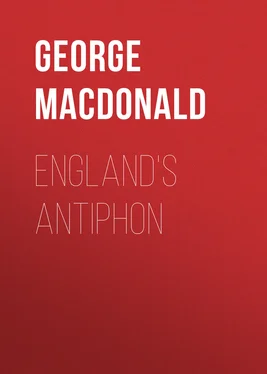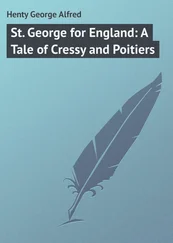George MacDonald - England's Antiphon
Здесь есть возможность читать онлайн «George MacDonald - England's Antiphon» — ознакомительный отрывок электронной книги совершенно бесплатно, а после прочтения отрывка купить полную версию. В некоторых случаях можно слушать аудио, скачать через торрент в формате fb2 и присутствует краткое содержание. Издательство: Иностранный паблик, Жанр: foreign_poetry, Поэзия, foreign_antique, foreign_prose, на английском языке. Описание произведения, (предисловие) а так же отзывы посетителей доступны на портале библиотеки ЛибКат.
- Название:England's Antiphon
- Автор:
- Издательство:Иностранный паблик
- Жанр:
- Год:неизвестен
- ISBN:нет данных
- Рейтинг книги:3 / 5. Голосов: 1
-
Избранное:Добавить в избранное
- Отзывы:
-
Ваша оценка:
- 60
- 1
- 2
- 3
- 4
- 5
England's Antiphon: краткое содержание, описание и аннотация
Предлагаем к чтению аннотацию, описание, краткое содержание или предисловие (зависит от того, что написал сам автор книги «England's Antiphon»). Если вы не нашли необходимую информацию о книге — напишите в комментариях, мы постараемся отыскать её.
England's Antiphon — читать онлайн ознакомительный отрывок
Ниже представлен текст книги, разбитый по страницам. Система сохранения места последней прочитанной страницы, позволяет с удобством читать онлайн бесплатно книгу «England's Antiphon», без необходимости каждый раз заново искать на чём Вы остановились. Поставьте закладку, и сможете в любой момент перейти на страницу, на которой закончили чтение.
Интервал:
Закладка:
Wynter wakeneth al my care,
Nou this leves waxeth bare,
Ofte y sike ant mourne sare, sigh; sore.
When hit cometh in my thoht
Of this worldes joie, how hit goth al to noht.
Now hit is, ant now hit nys, it is not.
Also hit ner nere y-wys, 9 9 "All as if it were not never, I wis."
That moni mon seith soth hit ys, 10 10 "So that many men say—True it is, all goeth but God's will."
Al goth bote Godes wille,
Alle we shule deye, thah us like ylle. though it pleases us ill.
Al that gren me graueth grene, 11 11 I conjecture "All that grain (me) groweth green."
Nou hit faleweth al by-dene; grows yellow: speedily.
Jhesu, help that hit be sene, seen.
Ant shild us from helle;
For y not whider y shal, ne hou longe her duelle. 12 12 Not is a contraction for ne wat, know not. "For I know not whither I must go, nor how long here I dwell." I think y is omitted by mistake before duelle.
I will now give a modern version of it, in which I have spoiled the original of course, but I hope as little as well may be.
Winter wakeneth all my care;
Now the trees are waxing bare;
Oft my sighs my grief declare 13 13 This is very poor compared with the original.
When it comes into my thought
Of this world's joy, how it goes all to nought.
Now it is, and now 'tis not—
As it ne'er had been, I wot.
Hence many say—it is man's lot:
All goeth but God's will;
We all die, though we like it ill.
Green about me grows the grain;
Now it yelloweth all again:
Jesus, give us help amain,
And shield us from hell;
For when or whither I go I cannot tell
There were no doubt many religious poems in a certain amount of circulation of a different cast from these; some a metrical recounting of portions of the Bible history—a kind unsuited to our ends; others a setting forth of the doctrines and duties then believed and taught. Of the former class is one of the oldest Anglo-Saxon poems we have, that of Caedmon, and there are many specimens to be found in the fourteenth and fifteenth centuries. They could, however, have been of little service to the people, so few of whom could read, or could have procured manuscripts if they had been able to use them. A long and elaborate composition of the latter class was written in the reign of Edward II. by William de Shoreham, vicar of Chart-Sutton in Kent. He probably taught his own verses to the people at his catechisings. The intention was, no doubt, by the aid of measure and rhyme to facilitate the remembrance of the facts and doctrines. It consists of a long poem on the Seven Sacraments; of a shorter, associating the Canonical Hours with the principal events of the close of our Lord's life; of an exposition of the Ten Commandments, followed by a kind of treatise on the Seven Cardinal Sins: the fifth part describes the different joys of the Virgin; the sixth, in praise of the Virgin, is perhaps the most poetic; the last is less easy to characterize. The poem is written in the Kentish dialect, and is difficult.
I shall now turn into modern verse a part of "The Canonical Hours," giving its represented foundation of the various acts of worship in the Romish Church throughout the day, from early in the morning to the last service at night. After every fact concerning our Lord, follows an apostrophe to his mother, which I omit, being compelled to choose.
Father's wisdom lifted high,
Lord of us aright—
God and man taken was,
At matin-time by night.
The disciples that were his,
Anon they him forsook;
Sold to Jews and betrayed,
To torture him took.
At the prime Jesus was led
In presence of Pilate,
Where witnesses, false and fell,
Laughed at him for hate.
In the neck they him smote,
Bound his hands of might;
Spit upon that sweet face
That heaven and earth did light.
"Crucify him! crucify!"
They cried at nine o'clock;
A purple cloth they put on him—
To stare at him and mock.
They upon his sweet head
Stuck a thorny crown;
To Calvary his cross he bears.
Pitiful, from the town
Jesus was nailed on the cross
At the noon-tide;
Strong thieves they hanged up,
One on either side.
In his pain, his strong thirst
Quenched they with gall;
So that God's holy Lamb
From sin washed us all.
At the nones Jesus Christ
Felt the hard death;
He to his father "Eloi!" cried,
Gan up yield his breath.
A soldier with a sharp spear
Pierced his right side;
The earth shook, the sun grew dim,
The moment that he died.
He was taken off the cross
At even-song's hour;
The strength left and hid in God
Of our Saviour.
Such death he underwent,
Of life the medicine!
Alas! he was laid adown—
The crown of bliss in pine!
At complines, it was borne away
To the burying,
That noble corpse of Jesus Christ,
Hope of life's coming.
Anointed richly it was,
Fulfilled his holy book:
I pray, Lord, thy passion
In my mind lock.
Childlike simplicity, realism, and tenderness will be evident in this, as in preceding poems, especially in the choice of adjectives. But indeed the combination of certain words had become conventional; as "The hard tree," "The nails great and strong," and such like.
I know I have spoiled the poem in half-translating it thus; but I have rendered it intelligible to all my readers, have not wandered from the original, and have retained a degree of antiqueness both in the tone and the expression.
CHAPTER II
THE MIRACLE PLAYS AND OTHER POEMS OF THE FOURTEENTH CENTURY.
The oldest form of regular dramatic representation in England was the Miracle Plays, improperly called Mysteries, after the French. To these plays the people of England, in the fourteenth and fifteenth centuries, owed a very large portion of what religious knowledge they possessed, for the prayers were in an unknown tongue, the sermons were very few, and printing was uninvented. The plays themselves, introduced into the country by the Normans, were, in the foolish endeavour to make Normans of Anglo-Saxons, represented in Norman French 14 14 I owe almost all my information on the history of these plays to Mr.Collier's well-known work on English Dramatic Poetry.
until the year 1338, when permission was obtained from the Pope to represent them in English.
The word Miracle , in their case, means anything recorded in Scripture. The Miracle Plays had for their subjects the chief incidents of Old and New Testament history; not merely, however, of this history as accepted by the Reformed Church, but of that contained in the Apocryphal Gospels as well. An entire series of these Miracles consisted of short dramatic representations of many single passages of the sacred story. The whole would occupy about three days. It began with the Creation, and ended with the Judgment. That for which the city of Coventry was famous consists of forty-two subjects, with a long prologue. Composed by ecclesiastics, the plays would seem to have been first represented by them only, although afterwards it was not always considered right for the clergy to be concerned with them. The hypocritical Franciscan friar, in "Piers Ploughman's Creed," a poem of the close of the same century, claims as a virtue for his order—
At markets and miracles we meddleth us never.
Читать дальшеИнтервал:
Закладка:
Похожие книги на «England's Antiphon»
Представляем Вашему вниманию похожие книги на «England's Antiphon» списком для выбора. Мы отобрали схожую по названию и смыслу литературу в надежде предоставить читателям больше вариантов отыскать новые, интересные, ещё непрочитанные произведения.
Обсуждение, отзывы о книге «England's Antiphon» и просто собственные мнения читателей. Оставьте ваши комментарии, напишите, что Вы думаете о произведении, его смысле или главных героях. Укажите что конкретно понравилось, а что нет, и почему Вы так считаете.












